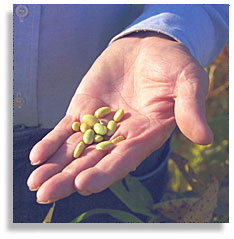|
details negative impacts of GMOs Detrimental effects to health, the environment, the social order and the economy Interview by Nic Paget-Clarke Chillicothe, Missouri
In Motion Magazine: What’s wrong with GMO’s (genetically modified organisms)? Bill Christison: There’s four problem areas with GMOs. One of them is the issue affecting health, the second one is the issues around the environment and the negative consequences there. The third is the social ramifications for the people of the world. And the fourth is economic, and the negative consequences there. Health is probably in the final analysis the biggest problem, and the environment would be the second, the social is the third greatest in importance, and the economics is the last in importance. But probably the world people, the consumers and farmers that produce GMOs would look at this exactly backwards. The economics effects people in the pocket book first and that is where people first feel the pain. The other issues will take longer, but will make a much more damaging statement. In Motion Magazine: Can you say a little more about how these areas interrelate? Bill Christison: Being a farmer for the last forty or fifty years I have seen and observed and have some basic knowledge of what is good for the environment and what is bad for the environment. With GMOs and the lack of testing of this technology it’s very apparent that there could be extreme consequences to our environment. For example, products like Bt corn and this is documented in the Cornell report, Bt corn pollen is damaging insects like the monarch butterflies and a number of other insects which reproduce in a similar way. This will affect the natural order of insects both those which are beneficial and those that cause destruction - GMOs are upsetting mother nature and we have no idea what the final results will be. Consider the way the world has operated for ten or twelve thousand years. Indigenous peoples around the world have moved from one locality to another, and the most precious items that they took with them was the seeds that they are have been producing. They took these seeds to new areas, and those seeds were developed through the evolutionary process. The genes were not changed but through selective breeding people bred ever better and better plants. This has lead to a greater production which sustains life around the world. The loss of this kind of seed diversity is of critical importance. The social order of the world will change because of GMOs. Agriculture has been carried out for all these centuries and it has had a direct bearing on the way that civilization has supported the people of the world. Because you see we are looking at a situation that we have never looked at before. Agriculture as the world has always known it will be dramatically and permanently changed when the family farmers of the world, and this is especially true in third world nations are no longer able to make the decisions that they have always been able to make on what they plant, the way they plant it, and why they plant it.
Family farmers in the United States and around the world have bought in to this idea of allowing the life-science companies to control the technology and they will be producing a product which will be never sold. No one will know the value of that production. I guess we could go so far as to make the case that there will be no need for price discovery systems like the Chicago Board of Trade. The product will be produced and transported so that the first time that you will actually see a price will be whenever the end product arrives in the showcase in the supermarket. I think that this will totally change the social order that has been in the world for all these centuries. The economic impact of GMOs, on the other hand, is something that is already very apparent. You don’t have to look very far. You can see what is taking place right now with GMOs. The Monsanto’s of the world are trying now to define markets for the products that they have developed and farmers have planted. But now, some of these products are not going to be accepted for sale in certain areas of the United States this year. The farmers have been sold a bill of goods and they have put out a product with great expectations and now those expectations have been dashed by the non-acceptance of GMOs by importing nations. It’s going to cause a backlash on the farmers. There could even be a multitude of lawsuits, farmer on farmer. There could be situations where even farmers who have planted non-GMO hybrids could have their crop pollinated by a neighboring GMO crop. This could render their crop as non-sellable too. I might just point out that the European foreign market historically has been about a 200 million dollars market for U.S. corn and now that market has nearly totally gone with just a small trickle of corn going to European markets. In Motion Magazine: What are some of the international impacts of these U.S. developments? Bill Christison: People around the world are very knowledgeable about the adverse impacts of decisions to allow GMO’s into the food chains in their countries. It’s politically the hottest potato in the world today. I might just say that the industrial age has come to a close and the reason that it has come to close is that technology has moved on. The industrialization of agriculture has become more apparent. The industrialization of the general economy has been accomplished. There are 1.9 million farmers in the U.S. By the latest count, we have 335,000 farmers producing 83% of our food and fiber. That figure equates to something less than 13 hundreds of one percent of the population of this country. So you see as far as industrialization is concerned they have gone as far as they can go. Even the movement of workers from the countryside to the factories - that part of the process is over. Now we are looking at a couple of new prospects. The smart money and the new issues are the life-science companies and the fast-moving communications processes. Huge amounts of capital are flowing into these two areas. That is why GMOs have taken over so quickly. Money is coming in here to support this kind of technology in chemical, seeds, and technology companies which thought they were going to go over with a bang and take over the production of food and fibers. But I do not believe that they will be successful. I think that people are concerned about how these food and fiber products are brought to market, and what they contain. These concerns are going to take precedence over the wishes of the life-science companies. I think that very soon we are going to see reductions in the amount of GMOs that are available around the world. In Motion Magazine: How have farmers been affected? Bill Christison: I think it’s very fair to say that the impact on farmers has been simply this - they have found that GMOs cost more and they yield less. I think that there are many problems that we’ve found about the failure of GMOs to live up to their promises. The truth is that I have never seen a comparative test in which GMOs out-yield conventional crops. The Bt cotton is a prime example of this. There have been a multitude of lawsuits. It’s my understanding that Monsanto alone has been looking at 200 lawsuits. There is an increasing number of recognized scientists around the world who do research everyday on whether GMOs are good or bad. Ultimately, though, the decision is going to be made by consumers, and consumers are going to dictate what farmers do. Farmers are just beginning to see the negative side of GMOs. Whenever you look at transnational corporations offering premiums for non-GMO crops I think that that is an indication that corporations are beginning to recognize that the consumer is king and that eventually, if they are going to be successful, they have to give the consumers what they want instead of trying to force a product down their throats. There have been a great number of farmers who have fallen into the GMO trap. There’s a real reason that this happened you know. It’s because the farmers throughout the world are producing at less than the cost of production. Farmers especially are up against the wall with debt trying to manage their resources the best way possible in order that they can pay their debt and make a living. A lot of farmers, men and women, have off-farm employment. There has to be some give in the system somewhere. We can make these changes through better agriculture policy. In Motion Magazine: I understand there’s a possibility that some changes may take place through the courts. Bill Christison: It’s a natural next step in the progression of developing this issue that litigation be part of that process. We are looking at anti-trust suits against the life-science companies, against the chemical corporations. We have already begun a process with some of the most recognized law firms around the world, though most are at the present time in the U.S. This will become an international issue of anti-trust. I think we are headed for a show-down with ten or less life-science companies on who is going to control GMOs. We are headed towards a showdown over whether or not we are going to try and put the genie back in the bottle, so to speak. Also see:
|
||||||||||||||||||||||||
| Published in In Motion Magazine - October 29, 1999 |
||||||||||||||||||||||||
If you have any thoughts on this or would like to contribute to an ongoing discussion in the  What is New? || Affirmative Action || Art Changes || Autonomy: Chiapas - California || Community Images || Education Rights || E-mail, Opinions and Discussion || En español || Essays from Ireland || Global Eyes || Healthcare || Human Rights/Civil Rights || Piri Thomas || Photo of the Week || QA: Interviews || Region || Rural America || Search || Donate || To be notified of new articles || Survey || In Motion Magazine's Store || In Motion Magazine Staff || In Unity Book of Photos || Links Around The World NPC Productions Copyright © 1995-2020 NPC Productions as a compilation. All Rights Reserved. |
||||||||||||||||||||||||



